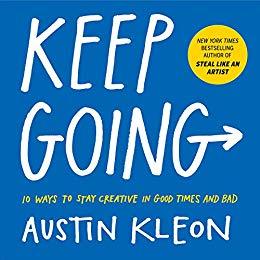More on this book
Community
Kindle Notes & Highlights
by
Austin Kleon
Read between
March 23 - April 9, 2025
The truly prolific artists I know always have that question answered, because they have figured out a daily practice—a repeatable way of working that insulates them from success, failure, and the chaos of the outside world.
We have so little control over our lives. The only thing we can really control is what we spend our days on. What we work on and how hard we work on it. It might seem like a stretch, but I really think the best thing you can do if you want to make art is to pretend you’re starring in your own remake of Groundhog Day: Yesterday’s over, tomorrow may never come, there’s just today and what you can do with it. “Any man can fight the battles of just one day,” begins a passage collected in Richmond Walker’s book of meditations for recovering alcoholics, Twenty-Four Hours a Day. “It is only when you
...more
When you don’t have much time, a routine helps you make the little time you have count. When you have all the time in the world, a routine helps you make sure you don’t waste it. I’ve written while holding down a day job, written full-time from home, and written while caring for small children. The secret to writing under all those conditions was having a schedule and sticking to it.
A little imprisonment—if it’s of your own making—can set you free. Rather than restricting your freedom, a routine gives you freedom by protecting you from the ups and downs of life and helping you take advantage of your limited time, energy, and talent. A routine establishes good habits that can lead to your best work.
Leonardo da Vinci made “to-learn” lists. He’d get up in the morning and write down everything he wanted to learn that day.
When I’m stuck in the morning and I don’t know what to write about in my diary, I’ll modify the pros-and-cons list. I’ll draw a line down the middle of the page, and in one column I’ll list what I’m thankful for, and in the other column, I’ll write down what I need help with. It’s a paper prayer.
“The phone gives us a lot but it takes away three key elements of discovery: loneliness, uncertainty, and boredom. Those have always been where creative ideas come from.” —Lynda Barry
The great artists are able to retain this sense of playfulness throughout their careers. Art and the artist both suffer most when the artist gets too heavy, too focused on results.
If you want to change your life, change what you pay attention to. “We give things meaning by paying attention to them,” Jessa Crispin writes, “and so moving your attention from one thing to another can absolutely change your future.” “Attention is the most basic form of love,” wrote John Tarrant. When you pay attention to your life, it not only provides you with the material for your art, it also helps you fall in love with your life.


